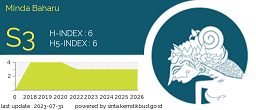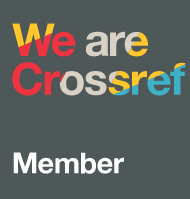PERLUASAN WAWASAN TENTANG ‘INFORMASI TOXIC’ PADA SERANGAN PASCA COVID-19 DI INDONESIA
Abstract
Keywords
Full Text:
PDFReferences
Adobe Spark. (2021). The 7 top social media sites you need to care about in 2020. Diunduh pada 1-9-2021 melalui https://www.adobe.com/express/learn/blog/top-social-media-sites
Alhabash, S., dan Ma, M. (2017). A tale of four platforms: Motivations and uses of facebook, twitter, instagram, and snapchat among college students?. Social Media + Society. https://doi.org/10.1177/2056305117691544
Amalia, S., Wijaya, A., Darma, D. C., Maria, S., dan Lestari, D. (2020). Underground economy: Teori & catatan kelam. Medan: Kita Menulis.
Badan Pusat Statistik – Republik Indonesia. (2020). Proporsi individu yang menggunakan internet menurut provinsi (persen), 2017-2019. Diunduh pada 2-9-2021 melalui https://www.bps.go.id/indicator/27/1225/1/proporsi-individu-yang-menggunakan-internet-menurut-provinsi.html
Cahyono, A. S. (2016). Pengaruh media sosial terhadap perubahan sosial masyarakat di Indonesia. Jurnal Publiciana, 9(1), 140-157.
Chan, W. S., dan Leung, A. Y. (2018). Use of social network sites for communication among health professionals: Systematic review. Journal of Medical Internet Research, 20(3), e117. https://doi.org/10.2196/jmir.8382
Clark, J. L., Algoe, S. B., dan Green, M. C. (2018). Social network sites and well-being: The role of social connection. Current Directions in Psychological Science, 27(1), 32–37. https://doi.org/10.1177/0963721417730833
Dwivedi, Y. K., Ismagilova, E., Hughes, D. L., Carlson, J., Filieri, R., Jacobson, J., Karjaluoto, H., …..Wang, Y. (2021). Setting the future of digital and social media marketing research: Perspectives and Research Propositions. International Journal of Information Management, 59, 102168. https://doi.org/10.1016/j.ijinfomgt.2020.102168
Febriani, R. D., Triyono, T., Hariko, R., Yuca, V., dan EMagistarina, E. (2021). Factors Affecting Student’s Burnout in Online Learning. Jurnal Neo Konseling, 3(3), 32-38. https://doi.org/10.24036/00567kons2021
Gustomy, R. (2020). Pandemi ke infodemi: Polarisasi politik dalam wacana covid-19 pengguna twitter. JIIP: Jurnal Ilmiah Ilmu Pemerintahan, 5(2), 19-205. https://doi.org/10.14710/jiip.v5i2.8781
Ilmi, Z., Wijaya, A., Kasuma, J., dan Darma, D. C. (2020). The crowdsourcing data for innovation: Does it Matter?. European Journal of Management Issues, 28(1-2), 3-12. https://doi.org/10.15421/192001
International Telecommunications Union. (2021). Telegram closed list of countries by number of internet users. Diunduh pada 31-8-2021 melalui https://id.wikipedia.org/wiki/Daftar_negara_menurut_jumlah_pengguna_Internet
Jia, R., Ayling, K., Chalder, T., et al. (2020). Mental health in the UK during the COVID-19 pandemic: Cross-sectional analyses from a community cohort study. BMJ Open, 10(9), e040620. https://doi.org/10.1136/bmjopen-2020-040620
Jiuhardi, J., Darma, D. C. dan Heksarini, A. (2021). The political-economy management: Indonesia's needs for the Covid-19 pandemic. Problems of Management in the 21st Century, 16(1), 19-27. https://doi.org/10.33225/pmc/21.16.19
Jothi, P. S., Neelamalar, M., dan Prasad, R. S. (2011). Analysis of social networking sites: A study on effective communication strategy in developing brand communication. Journal of Media and Communication Studies, 3(7), 234-242.
Kata Data. (2019). Indonesia pengguna internet terbesar ketiga di Asia. Diunduh pada 3-9-2021 melalui https://databoks.katadata.co.id/datapublish/2019/07/18/indonesia-pengguna-internet-terbesar-ketiga-di-asia#
Kata Data. (2021). Jumlah pengguna media sosial di dunia capai 4,2 miliar. Diunduh pada 1-9-2021 melalui https://databoks.katadata.co.id/datapublish/2021/02/18/jumlah-pengguna-media-sosial-di-dunia-capai-42-miliar#
Kementerian Komunikasi dan Informatika – Republik Indonesia. (2021). Empat pilar literasi untuk dukung transformasi digital. Diunduh pada 2-9-2021 melalui https://aptika.kominfo.go.id/2021/01/empat-pilar-literasi-untuk-dukung-transformasi-digital/
Lestari, F. F., dan Atnan, N. (2021). Pengaruh hoaks covid-19 di media sosial facebook terhadap opini publik di Desa Mancagahar Kabupaten Garut. eProceedings of Management, 8(3), 1-10.
Maramis, J., dan Tawaang, E. (2021). Hubungan pembelajaran daring dengan burnout pada mahasiswa profesi ners universitas klabat di era pandemi covid-19. Klabat Journal of Nursing, 3(1), 68-76. https://doi.org/10.37771/kjn.v3i1.546
Maria, S., Darma, D. C., Amalia, S., Hakim, Y. P., dan Pusriadi, T. (2019). Readiness to face industry 4.0. International Journal of Scientific & Technology Research, 8(9), 2363-2368.
Ramdani, R., Shalehoddin, S.,Sagita, D. D., Ramanda, P., dan Sarman, F. (2021). Handling the psychological impact of covid-19 on community through various tutorial videos of daily effective life. Minda Baharu, 5(1), 34-40. https://doi.org/10.33373/jmb.v5i1.2930
Pantano, E., dan Di Pietro, L. (2012). Understanding consumer’s acceptance of technology-based innovations in retailing. Journal of Technology Management &Amp; Innovation, 7(4), 1–19. https://doi.org/10.4067/S0718-27242012000400001
Pfefferbaum, B., dan North, C. S. (2020). Mental health and the covid-19 pandemic. The New England Journal of Medicine, 383(6), 510–512. https://doi.org/10.1056/NEJMp2008017
Santoso, M. D. (2021). Faktor-faktor yang berhubungan dengan burnout pada tenaga kesehatan dalam situasi pandemi covid-19. Jurnal Keperawatan Tropis Papua, 4(1), 1-10. https://doi.org/10.47539/jktp.v4i1.176
Saputri, O. B., dan Huda, N. (2020). Pengaruh informasi covid-19 melalui media sosial terhadap perilaku konsumen. Human Falah: Jurnal Ekonomi dan Bisnis Islam, 7(2), 1-26.
Sari, F. L. (2020). Dampak pemberitaan covid19 di media sosial terhadap perilaku masyarakat di Dusun Kemuning Kelurahan Lirboyo Kota Kediri. Jurnal Mediakita: Jurnal Komunikasi dan Penyiaran Islam, 4(1), 1-14. https://doi.org/10.30762/mediakita.v4i1.2449
Sari, M. K., dan Yoni, E. (2021). The impacts of covid-19 pandemy in term of technology literacy usage on students learning experience. Jurnal Sosial Humaniora, 14(2), 43-51. http://dx.doi.org/10.12962/j24433527.v0i0.8348
Vedavanam, K., Garrett, D., Davies, N., dan Moore, K. J. (2020). Old age psychiatry services in the UK responding to COVID-19. International Psychogeriatrics, 32(10), 1165–1168. https://doi.org/10.1017/S1041610220001015
Wallinheimo, A.-S., dan Evans, S. L. (2021). More frequent internet use during the COVID-19 pandemic associates with enhanced quality of life and lower depression scores in middle-aged and older adults. Healthcare, 9(4), 393 https://doi.org/.10.3390/healthcare9040393
DOI: https://doi.org/10.33373/jmb.v5i2.3480
Refbacks
- There are currently no refbacks.
License URL: https://creativecommons.org/licenses/by/4.0/

Ciptaan disebarluaskan di bawah Lisensi Creative Commons Atribusi 4.0 Internasional.
















